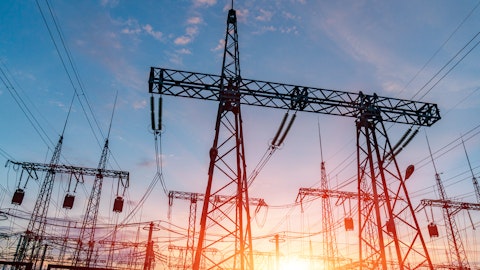Steven Kobos: Thanks Michael. Thanks for the question. It’s not going to be specific for individual markets. You know that we are bullish on the asset class in general. We believe that folks that have the energy security of FSRU have it now, whether or not they may take long strips of LNG or not, we think it’s affordable insurance. And that people — once they have the security of that affordable insurance, that they’re going to be sticky. I think I made that point with you in New York last December, and that my view hasn’t changed there at all. In terms of these different markets we’re looking at, though, some could use incremental FSRUs, some without getting too into jargon, some could use a floating storage unit, or FSU, which is more like a conventional carrier that with shore-based re-gas.
Some of those markets we discussed are clearly an LNG to power play. And then some are focused on just import terminals, breaking the volumes up, distributing the — the commonality they all have is its infrastructure. So we’re looking at different types of infrastructure depending upon what an individual market needs, and it’s just going to vary. But I would leave you that we remain bullish on the FSRU asset class and every market will require a new FSRU. Some will, and we are committed to remaining the preferred partner for countries seeking energy security. And we’re going to take the necessary steps.
Michael Blum: Okay. Thank you.
Operator: Our next question comes from Zack Van Everen with Tudor, Pickering & Holt. Your line is open.
Zack Van Everen: Hi all. Thanks for taking my questions. Just wanted to follow-up on an earlier question. Going into 2024, it sounds like a majority of the FSRUs are now under contract. I just wanted to — the additional color on the ability to market some of those. You mentioned on the Express, whether it’s seasonality within those contracts, do you guys still have the ability to take advantage or help out a situation like what happened in Finland, if that were to happen going forward? Just any flexibility on current contracts to use the ships in different markets in different seasons.
Steven Kobos: Thanks Zack. That one is pretty simple. These are critical energy security for a country, so it shouldn’t be surprising we don’t have a call, right, to say, hey, we’d like to leave you in a lurch. This will be a bilateral discussion, but people have this bilateral discussions. We have those discussions. We’ve always had those discussions. And that’s how we got Germany to help out Argentina this past year. In years past, we have borrowed the Express seasonally. Now, I would say it’s got to be a clear defined opportunity. And it’s going to vary over time, depending upon what the near-term geopolitical risk profile is. I’m glad you mentioned Finland though, because, for example, with the disruption of the Baltic Connector pipeline between Finland and Estonia, they’re not getting gas from Russia, probably never going to get gas from Russia again because they have a long memory and they can’t get the pipeline from the continent.
So, we are providing the overwhelming majority of Finland’s natural gas needs. It’s a mature economy. They have a relatively small need for natural gas, but that need they have is absolutely critical to their economy. And that’s a situation where I wouldn’t expect anyone to let go of bit. Other folks are going to have different needs in places with extensive hydro power, you might have visibility of full year out reservoirs, what your needs will be. So, I just want to be clear, it’s a very individual discussion that we have with our customers. But we are always having those discussions, and we are looking for win-wins. And I think we’ve done a good job of identifying win-wins in the past, and you can count us to continue to do that.
Zack Van Everen: Perfect. Appreciate that. And one last quick one. Can you remind me of what other contracts have the CPI or inflation pauses in the contract?
Steven Kobos: That’s one — I got to look over to Dana again to see what we’ve disclosed–
Dana Armstrong: Yes. gain again to see what we’ve not disclosed, but it’s the vast majority of our contracts that have that. And for most of those contracts, it’s effective in — at midyear. So, that’s why we saw a little bit of a bump in the third quarter.




